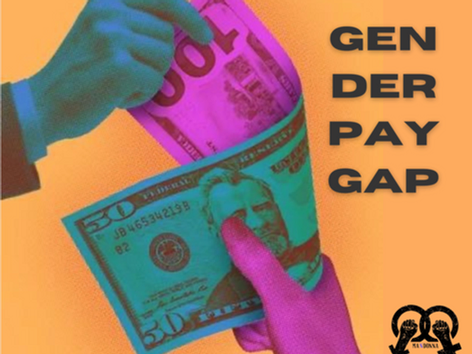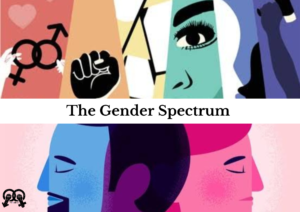Learning Outcomes:
- What’s Gender Pay Gap and how does it affect men and women?
- Analysis of The Global Gender Pay Gap Report, 2022 from World Economic Forum
- What are the actual reasons for Gender Pay Gap?
- How has Wisdom Economy helped in subsiding the effects of the Gender Pay Gap
The discussions on the pay gap between genders have been on the table for a long time and the governments of different countries have ensured several policies to abolish this gap. All the big corporations, trillion-dollar companies and rich people of the world are placing these policies, yet we are far away from the reality as the gender gap has been impacting both genders for years!
Both genders? Yes, there is no mistake in the above lines, the study focuses on the impacts of the gender pay gap on both genders and how the impacts can reduce over time.

Women around the world are being paid less as compared to Men for the same category of work. The public has varied views over the same- as the females fight for their rights to get the same pay for the same work, and the men take examples of fields where men are higher in numbers as compared to women to justify the pay gap.
The reasons for the gender pay gap are endless as different societies have different thoughts on the issue but if we have to trace down the core issues, then we can say that the representation of women in the work industry has always been low. This is further supported by the contribution of women in tasks that require less energy as they were required to save their energy for their home chores, while men of the house didn’t contribute for the same. The issue is further supported by male domination in the work industry and the archaic thought of women belonging to the home or they are less capable than men.
These core reasons have their roots at the beginning of civilisation, but the problem persists in the current decade too.
Is the gender pay gap a thing of this decade?
In short terms, yes, it is a thing of this decade and meanwhile, the gap is narrowing, at the current rate of progress it will take more than 70 years to close it completely. The Global Gender Gap Report 2022 from World Economic Forum suggests that the Gap in 2022 is 68.1% closed. The overall gender parity score rose from 67.9% in 2021 to 68.1% in 2022, considering the constant sample of 145 countries covered in both the 2021 and 2022 editions of the report.
The report provides scores from 0-1 to the countries where scoring 1 means achieving 100% Gender Parity. No country has achieved 100% Gender Parity yet.

The Gender Pay Gap is a problem that started from the beginning of civilisation, the period when humans were involved in activities like farming, construction, labour, wars, and hunting. The one thing common in these activities was that they required intensive muscle work and in those periods the women were required to look after their children (credits to high fertility rates). As a consequence, women were unable to fully dedicate their energy to their work, resulting in them earning less income compared to their male counterparts.
Fast forward to the 1860s-the year in which the “gender pay gap” issue became political under the rallying voice of “Equal Pay for Equal Work.” Followed by this several protests occurred, and bills were presented in the parliaments of different countries around the world to eliminate the gender pay gap, yet the gap has persisted over the years and is still narrowing and will take several decades if stronger policies are not introduced.
Why Gender Gap still exists in 2023?
Governments around the world have introduced several policies, yet the problem persists. The reason for the same is that the gap majorly exists in low-paying jobs, and such jobs miss the required government documentation and never see the government data records for legal scrutiny. Thus, the employers can pay their wished salaries and sometimes these amounts are below minimum wage as well. The rise in population and the incapability of people to do a skilled job makes them helpless and thus these people are left with no other option. Women are the top victims of this unorganised labour system. The only information these women are aware of is that women are paid less than men for the same category of jobs, due to a lack of awareness campaigns.
The governments have also allowed corporates to maintain a minimum pay gap by setting different benchmarks for men and women in terms of minimum wage. Further, the pay gap helps corporates to save their costs as they can get the same amount of work by paying less wages. The female dominating industries too, have the same problem.
On paper, responsible corporates can maintain the gap by taking benefits from the unskilled and unorganised labour industry. This explains we need to invest in research to understand the core reasons with today’s perspective as even in 2023 we are associating the problem with our past whereas in the modern era, the problem too has adapted itself to the loopholes of the present era.
There is one more side to the same scenario that justifies the gender pay gap in 2023, based on a real incident that took place at a site where cleaners- both men and women were hired on a contract basis.
It was learnt that the women in these industries don’t work with their 100% capability as they are being paid less as compared to their male counterparts, they also sometimes take frequent half days/ weekly or monthly holidays without prior information by sighting their family issues.
This lesser contribution allows the corporates/businesses/employers to justify the lower wages. The lesser representation of women in certain industries further increases the issue as it becomes difficult to identify the capabilities of women in certain industries to fix higher pay.

Do men take equal pay as a challenge to their position in society?
The answer to the above question lies among the societal behaviour and how the markets have adapted themselves with unfair salary systems. In India, informal sector jobs are majorly responsible for the Gender Pay Gap, for jobs like House Cleaning, or Labour, the men are being paid more than women. There is a difference in pay rates from 30% – 50% for these jobs and even if an employer pays equal amount to the both the genders, the male colleague finds it disrespectful as the society has made the mind to adapt that men deserve more pay for the same job as they are physically stronger and thus can do the work better. The psychological impact on the women colleague can be-“since I am going paid less why should I work with my full capacity as I need to go home and take care of my family as well.”
The mindset of men towards equal pay also impacts the corporate sector, the male employees do not like if the female employee receives a promotion or some other achievement as they feel insecure in losing their dominance at the place.
How is the society impacted from the pay discrimination?
The thought that men are the ultimate beneficiaries of the Gender Pay Gap is wrong as the Gender Pay Gap has negative consequences for both Men and Women!
The men are required to earn more to cover the differences in income to feed their family and fulfil their needs. The pressure of earning more leads to several issues like stress and burnout. Apart from income differences, the Gender Pay Gap creates difficulties to find a suitable friend circle or partner that allows the person to grow by utilising each other’s resources. A partner or friend with similar income means they can contribute to growth plans, and quality life. The other issues can include reluctance of the female friend/partner to contribute equal amounts due to lesser earning capacities.
The Gender Pay Gap can result in slower economic growth as the spending capacity of the women will be low due to lesser earning capacities and the psychological tendency to save the money they earn. The women also get discouraged to contribute to the workforce due to the earning differences and even feel hat they are not being treated fairly; this can lead to the social unrest.
The burden of development lies on the shoulders of one half of the society due to discrimination placed by the same society on the other half. The irony has been accepted by the people and thus we do not care about the efforts of the government and a sec6on of society that is fighting for fair and equal rights for all.
How wisdom economy is almost immune to the gap and how it has all not conquered over the informal sector?
The wisdom economy has maintained a reputation of providing equal pay for same roles to all genders. The claim is true in many ways as the industry entirely works on the capabilities and requirements of the candidate and thus the pay is either decided based on needs of the candidate or it can be fixed for all candidates by the employers. The term market standard for this very reason is highly used in the industry. The problem here is that gender pay gap can be disguised here in name of capabilities, but the gap can occur for any gender i.e., maybe women are being paid more than men. (This statement is not true for large group but can be considered true for individual comparison).
Now, talking about Wisdom industry and Informal sector, the differences are huge and Informal sector is famously responsible for the wide gender gap. The reasons for, why the wisdom industry have not conquered the informal sector can be considered as lack of education among people, gender stigma in the society, lack of skill development, and unfair practices of corporates. Further, a large population has still not moved towards the wisdom industry due to lack of resources or lack of opportunities and since the larger chunk belongs to the informal sector the gap remains widened.
What Next?
Stronger and aggressive efforts are required from the side of organisations, NGO’s, Governments, and individuals to narrow this gap. The promotion of gender equality in the workplace, investing in education and training of the women, and providing paid parental leave and other family-friendly policies will lead to a growth of Gender Pay Parity score.
An effort from women to lead ventures and organisations will motivate the other women to take steps in favour of placing efforts to stand with their head high in these growing economies. This will motivate the other females to take initiatives and will make them confident to work and achieve in highly competitive environments. A company cannot afford to lose a hardworking employee and thus providing apt remuneration is the only option available.
Further, Education system around the world should focus on changing the societal thinking and educate the children towards an equal and fair world that ensures the compensation system works according to the work and capabilities of a human, irrespective of their gender, and social factors.
The high skill industries like the IT industry of top executive jobs on the other hand have equal pay policies as these industries are purely based on capability of a candidate and hence the remuneration is decided based on the capability of the employee and the prior working experiences.
References
- Gould, R. • B. E. (n.d.). What is the gender pay gap and is it real?: The Complete Guide to how women are paid less than men and why it can’t be explained away. Economic Policy Institute. https://www.epi.org/publication/what-is-the-gender-pay-gap-and-is-it-real/
- OpEd: The Gender Pay Gap, hard truths and actions needed. OpEd: The gender pay gap, hard truths and actions needed. (2022, September 19). https://www.ilo.org/newdelhi/info/public/fs/WCMS_857392/lang–en/index.htm#:~:text=While%20the%20gender%20pay%20gap,and%20closing%20the%20existing%20gap.
- World economic forum. (n.d.). https://www3.weforum.org/docs/WEF_GGGR_2022.pdf
- Global gender gap report 2022. World Economic Forum. (n.d.). https://www.weforum.org/reports/global-gender-gap-report-2022/
Akshat Jain is a 21-year-old human, trying to find his basics in this not-so ‘boring world’. He follows consumer technology for fun and sees himself as a storyteller, narrating the world his brand stories.





